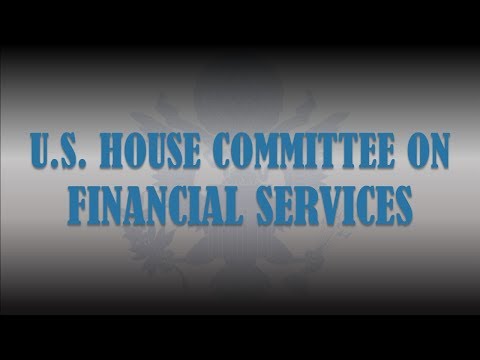Wednesday, December 4, 2019 (10:00 AM) — Hearing: Oversight of Prudential Regulators: Ensuring the Safety, Soundness, Diversity, and Accountability of Depository Institutions?
Connect with the House Financial Services Committee
Get the latest news: https://financialservices.house.gov/
Follow us on Facebook: https://www.facebook.com/FinancialDems/
Follow us on Twitter: https://twitter.com/FSCDems
—————————
This will be a one-panel hearing with the following witnesses:
• The Honorable Rodney Hood, Chairman, National Credit Union Administration
• The Honorable Jelena McWilliams, Chairman, Federal Deposit Insurance Corporation
• The Honorable Randal Quarles, Vice Chairman of Supervision, Board of Governors of the
Federal Reserve System
Purpose
This hearing will focus on the responsibility for prudential regulation of insured depository institutions is divided among four Federal regulators consisting of the Board of Governors of the Federal Reserve System (Federal Reserve), Federal
Deposit Insurance Corporation (FDIC), Office of the Comptroller of the Currency (OCC), and the National
Credit Union Administration (NCUA). Section 1108 of the Dodd-Frank Wall Street Reform and Consumer
Protection Act (Dodd-Frank Act) created the position of Vice Chairman for Supervision for the Federal
Reserve and requires the Vice Chairman to testify before the Committee at semi-annual hearings.
The FDIC,
OCC,and NCUA do not have such mandatory testimony requirements.
This hearing will examine various
supervisory and regulatory developments, rulemakings, and other regulatory activities enacted since these
agency principals last testified before the Committee on May 16, 2019.
In 2010, Congress passed the Dodd-Frank Act into law to address many of the regulatory failures that contributed to the financial crisis. In addition to implementing Dodd-Frank rules, regulators have
implemented the Basel III capital reforms to strengthen the resiliency of the banking system. Since 2017,
the Trump Administration has made financial deregulation a top priority, with the Department of the Treasury
issuing a series of reports with recommendations for regulatory and legislative reforms.
Last year, Congress passed S. 2155 into law, which included various deregulatory provisions, that regulators have either finalized
or are in the process of implementing.
This hearing memo will briefly highlight recent supervisory and
regulatory developments, as well as background on diversity in the banking sector.
Recent Supervisory and Regulatory Developments
Community Reinvestment Act. On August 28, 2018, the OCC issued an Advanced Notice of Proposed
Rulemaking (ANPR) related to modernizing the Community Reinvestment Act (CRA), receiving nearly
1,500 comments. While the Federal Reserve and FDIC have worked with the OCC to review the ANPR
comments, stakeholders have expressed strong concerns that the substance of the ANPR could weaken key
aspects of CRA regulations, and that the agencies may not issue a joint rulemaking, creating the potential for
regulatory arbitrage. Recent comments from FDIC Chairman McWilliams have indicated the FDIC may
join the OCC on issuing a proposal as early as December, without the support of the Federal Reserve.
Enhanced Prudential Standards.
In October 2019, the Federal Reserve finalized a rule to create a tiered and tailored enhanced prudential standards (EPS) framework for banks of various sizes, including foreign
banking organizations. Additionally, in May 2019, the Federal Reserve and FDIC issued a final rule which
created a tiered system of resolution planning (referred to as “living wills”) easing what generally was a full
plan submission requirement every two years to a modified two-year cycle for U.S. G-SIBs and a three-year
cycle for large regional and foreign banks. These large banks are now required to provide a targeted plan in
one submission cycle and a full plan in the following cycle, meaning complete living wills will be updated
once every four years for U.S. G-SIBs and once every six years for other large banks.
Furthermore, earlier
this year, the Federal Reserve made revisions to the stress-testing regime to, among other things, limit the
use of the “qualitative objection,” which may make it easier for large banks to pass their stress tests.
Real-Time Payments.
In August 2019, the Federal Reserve announced plans to create an interbank real-time
payments (RTP) system by 2023 or 2024. The Fed stated that the new system will be available to all banks
with a reserve account, and it will require banks using this new system to make those funds available to their
customers immediately after being notified of settlement. According to Fed Chair Powell, “the United States
is far behind other countries in terms of having real-time payments available to the…”
Hearing Page: https://financialservices.house.gov/calendar/eventsingle.aspx?EventID=404855
12/04/2019 — Oversight of Prudential Regulators: Ensuring the Safety… — (EventID=110286)
